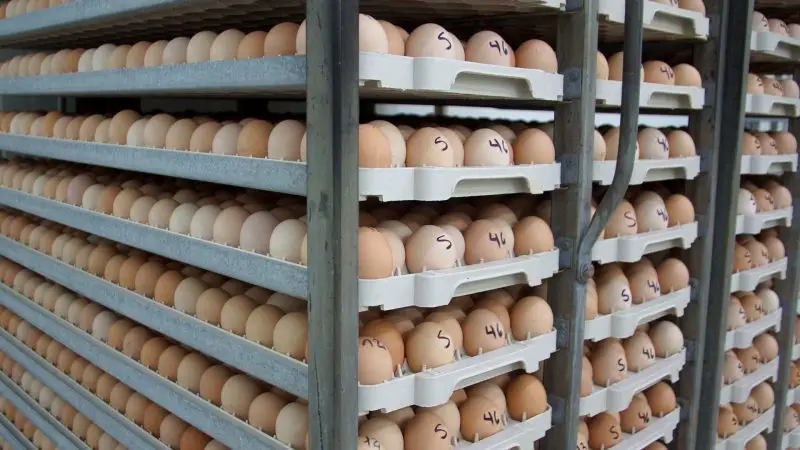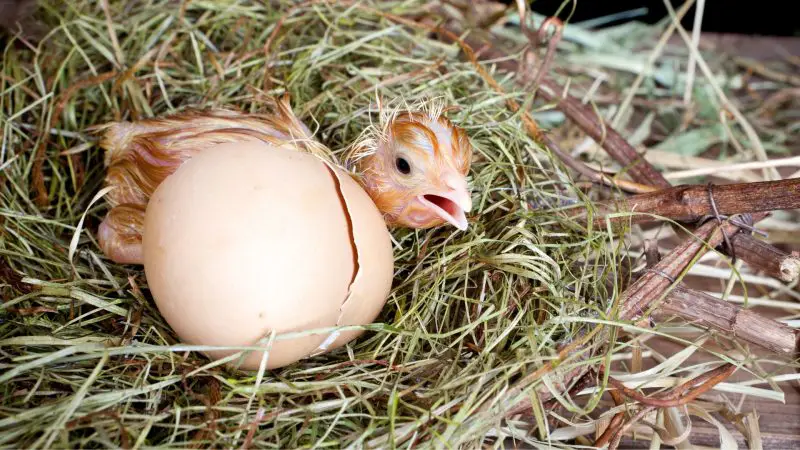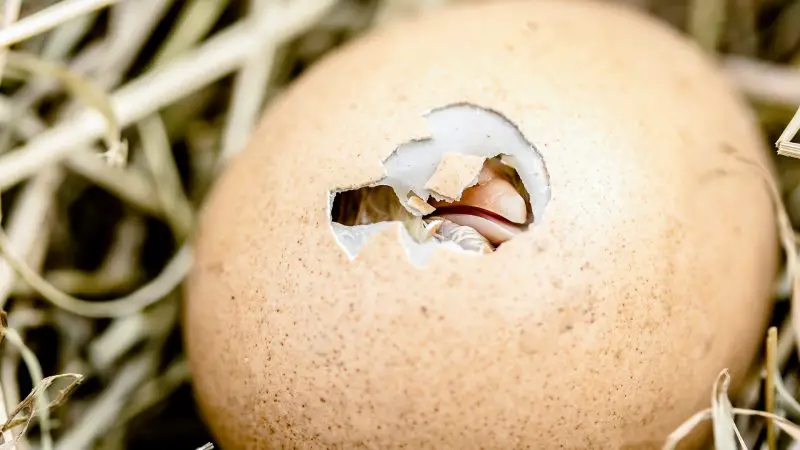Hatching eggs is not an easy process. It requires a lot of time and patience to be successful. When you decide to hatch some chicks, it’s essential to learn how it all works to ensure that your chicks hatch without any problems.
How long does it take for chicken eggs to hatch? Once a broody hen starts sitting on her eggs, it will take around 21 days for the eggs to hatch. Some larger species can take almost 28 days to hatch, while some smaller ones may need only 18-19 days.
Hatching chicken eggs is a lot of fun, but it can also be somewhat time-consuming. The remainder of the article will discuss various problems related to egg hatching and explain the incubation process in detail.
A Closer Look at the Incubation Process

Incubation is the process of maintaining a consistent temperature and humidity level so that eggs can adequately develop. When a hen lays a batch of eggs, she will sit on them for several days until they hatch – a period known as the incubation period.
The incubation period starts once the eggs have been fertilized. A batch of fertilized eggs is placed close to a broody hen. Depending on the size of the hen, she can choose up to 12 eggs to sit on, essentially starting the incubation period.
For the next 21 days, the hen will remain sitting on her egg, leaving her nest occasionally to drink, eat, and relieve herself. The hen will maintain the correct temperature and humidity by splashing water on the eggs. Sometimes, she will even pluck her feathers to ensure that the eggs receive proper heat from her skin.
On average, the incubation period lasts for 21 days. Once the eggs have hatched, the hen will start raising them – bringing the incubation process to a close. If everything goes well, you can expect 70%-80% of the initial batch to hatch properly.
What to Do if Your Eggs Are Not Hatching?

There’s no need to panic if you still have unhatched eggs by day 21. Likely, the humidity or temperature changed slightly during incubation. Wait a few days to see any differences. If the eggs don’t hatch by day 23, there’s likely to be a problem.
Here are a few things you can try to determine if your unhatched egg is a dud:
- Saltwater Floatation Technique: Submerge your unhatched egg in a dilute saltwater solution. If the egg floats and rotates, the chick might still be alive inside. Otherwise, if the egg sinks to the bottom, it’s a dud and should be discarded promptly.
- Candling Technique: Take a cardboard roll (you can retrieve one from a used toilet paper roll) and place the unhatched egg on one side and a flashlight on the other side. Shine the light in a dark room and observe the egg closely. If you can make out a veiny embryo, the egg is still in development and should be placed back in incubation. If you see nothing, the egg has been dead for quite some time.
Should You Help a Chick Hatch?
According to experts, you should not help a chick hatch at all. When an egg starts to hatch, the chick begins absorbing the blood vessels and yolk. It’s a process that takes quite some time. Some chicks can hatch within record time, whereas others can struggle for hours.
You should never assist a chick when it’s hatching, irrespective of how long it takes. If you end up forcing your way in, the chick won’t absorb the yolk – subsequently leading to its death. Chicks that can’t hatch on their own are prone to diseases and will inevitably die.
When to Help a Chick Hatch?
Although you should refrain from helping a chick hatch, there are specific scenarios where help might be necessary. But before you decide to intervene on an unhatched egg, ask yourself the following questions:
- Are the other eggs hatching as well? If not, then it’s likely a problem with the temperature or humidity. Leave the eggs in incubation for now.
- Do you see any signs of movement? If a struggling chick stops pecking at the eggshell and has remained lifeless for several hours, it may have thrown in the towel and accepted its fate. Leave the egg in incubation and discard it later.
- Do you see blood or veins? If you can spot blood or veins, the chick has not yet absorbed the yolk. Your only option is to leave the chick on its own.
If there is no sign of blood, the chick is actively struggling without any progress, and the other eggs have already hatched, only then can you proceed to help the chick. Just remember, if you assist the chick and it survives, it won’t be strong enough to thrive on its own.
What Helps Chicks Get Out of Their Shells?

Putting environmental factors aside, at the end of the day, it’s the chicks themselves that have to get out of their shells. Breaking through the hard shell of an egg is no easy task. Chicks will spend hours trying to tear through the membrane.
You’ll discover that most chicks have a difficult time hatching. Some chicks will even take periodic breaks during the pecking session. This is just a simple case of natural selection; only the strongest chicks can break through the shell and survive. Weaker chicks are left at nature’s mercy.
What Are the Factors Affecting Hatching Time?

- Temperature: Temperature is the most important factor for hatching time. If the temperature is too high, the egg will hatch earlier than expected. If it’s too low, the egg might not hatch at all.
- Humidity: Changes in humidity level can affect the development of membrane tissues. If the humidity is too low, the egg will lose moisture and weaken the embryo. A high humidity level can increase the mortality rate and result in a late batch.
- Eggs stored for too long: Fertilized eggs should not be kept in storage for too long. After 10 days, the hatchability of fertile eggs declines steeply.
- Diseased or infected eggs: Eggs can be contaminated if they aren’t handled properly. Bacteria and diseases severely affect hatchability. A contaminated egg may develop into an infected chick, which won’t be strong enough to break through an eggshell.
- Insufficient nutrients in the egg: The embryo may not develop properly if the egg contains nutritional deficiencies. Egg quality is directly influenced by the hen’s nutrition. So, ensure that your hens and roosters are provided with top-quality breeder nutrition.
- Lethal genes: Genes passed down from parents have a direct impact on hatchability. An infected or diseased hen can produce a poor batch.
What Is the Ideal Temperature for Hatching Chicken Eggs?
The ideal temperature for hatching chicken eggs is 99°F (37.2°C). If the temperature deviates by even 1 degree, then it will affect the hatching process. During incubation, the temperature should be monitored regularly.
What Is the Proper Humidity Level for Hatching Chicken Eggs?
The ideal humidity for hatching chicken eggs is 60%. Changes in the humidity level can prove catastrophic. If the humidity is too low, there’s a risk that the membrane will become dry and harden up, making it difficult for the chick to break through the eggshell.
Likewise, the chick might drown in the excess water produced during incubation if the humidity is too high.
List of Sources
A Saltwater Flotation Technique to Identify Unincubated Eggs
